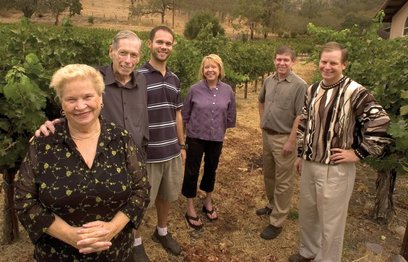In pursuit of options
Norman deLeuze fuels the hunt for a nontoxic cure for lymphoma

Norman deLeuze left a career in engineering to pursue his dream to be a full-time vintner. Finding alternative treatments for lymphoma is a dream that his family is still supporting. From left to right are Rosa Lee, Norman, their grandson, Brandon, and their children, Julie, Robert and Brett.
Norman deLeuze is a man accustomed to chasing big dreams. In 1968, the engineer teamed up with a colleague at Aerojet General in Rancho Cordova, Calif., to pursue a lifelong goal – the production of world-class wine. Before long, their business, ZD Wines, was born in a rented Sonoma farm building and the partners were producing 350 cases of wine from their first crush.
Now deLeuze is focusing his unbridled determination on another dream – the discovery of a nontoxic cure for lymphoma. Toward that goal, the vintner and his family have established an endowment supporting what they call "the outstanding research approach" of UC Davis oncologist Joseph Tuscano.
The fund was launched in December 2006 with a donation of $313,000 by the deLeuze family, their winery and their friends. DeLeuze is continually seeking outside support for the UC Davis endowment, and hopes it will break the $1 million mark by the end of this year.
For deLeuze, 75, the search for a cure is a highly personal cause. In January of 2004, the UC Berkeley graduate was diagnosed with mantle cell lymphoma, a subtype of non-Hodgkin's lymphoma. Originating in the body's white blood cells, known as lymphocytes, lymphoma kills more than 24,000 Americans every year.
For a health nut who took scrupulously good care of himself, the diagnosis was a shock, deLeuze's son, Brett, recalled.
"My father used to say he wanted to live to 120, and he followed a very healthy, nutrition-conscious lifestyle," said Brett deLeuze, who helps manage the winery along with his mother, Rosa Lee, and two siblings, Robert and Julie.
"Then he was diagnosed with cancer and told he was going to die within eight months without chemotherapy or radiation."
Despite that stark forecast, deLeuze said he was "not interested in those conventional medical approaches because of their toxicity." Instead, he began researching – and trying – a host of alternative treatments to fight his cancer, including high doses of intravenous vitamin C and a wide variety of other nutritional supplements.
Using his scientific background, deLeuze has done his best to distinguish the promising approaches from the dubious ones. But a lack of solid data has been a constant frustration.
‘'There are a lot of options out there but none of them has gone through clinical trials," deLeuze said. "Basic research that can help people make a careful evaluation and decide what to try is missing." At UC Davis, Tuscano is seeking to close that gap. Now the primary oncologist for deLeuze, Tuscano has been developing novel, immune-based therapies to treat lymphoma, including the use of monoclonal antibodies. He has also studied a variety of natural, homeopathic compounds, including fermented soy products, in collaboration with two cancer center colleagues, molecular geneticist Philip Mack and urologic oncologist Ralph deVere White, the UC Davis Comprehensive Cancer Center director.

